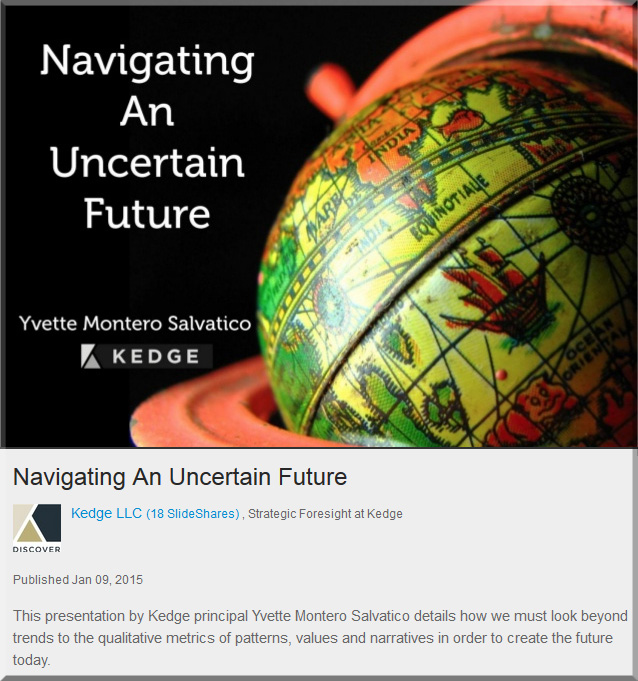Outlook: Future of work in 2015 — from research.gigaom.com by ; with thanks to Norma Owen for this resource
Excerpt:
With the likes of BYOD and collaboration tools now commonplace and expected, the enterprise turns its attention towards technologies and processes that will make day-to-day tasks more personalized, enhance employee engagement, and ultimately alter the overall culture of the workplace.
Among the trends we expect to surface or continue gaining ground in 2015 are:
- Artificial intelligence (AI). Next year will be a turning point for AI and algorithms for business thanks to the rapid maturation of those technologies. Social-network analysis will become the norm as companies continue to seek strategic insight from business intelligence (BI) and data analytics.
- Mobility continues its growth towards highly personal devices and practices like wearables and work chat, both of which put more control in the hands of the user/employee.
- The heightened awareness of costs associated with a disengaged workforce have led to the rise of a new class of software: culture-management tools. RoundPegg, CultureIQ, Waggl, and TINYpulse, among many others, are designed to keep track of employee sentiment, find problems that might affect morale or retention, and help drive initiatives to keep engagement high.
3 workplace trends to watch for in 2015 (and beyond) — from fortune.com by Anne Fisher
Artificial intelligence will rock the job market, your company will need a Chief of Work, and cubicle farms will disappear.
162 future jobs: Preparing for jobs that don’t yet exist — from http://www.futuristspeaker.com by Thomas Frey
Note from DSC: I don’t agree with some of these future jobs/directions, but Thomas’ point is for this posting to be a “thought-generator, an idea-sparker, to help you draw your own conclusions.”
Excerpt:
14 Hot New Skills
- Transitionists – Those who can help make a transition.
- Expansionists – A talent for adapting along with a growing environment.
- Maximizers – An ability to maximize processes, situations, and opportunities.
- Optimizers – The skill and persistence to tweak variables until it produces better results.
- Inflectionists – Finding critical inflection points in a system will become a much-prized skill.
- Dismantlers – Every industry will eventually end, and this requires talented people who know how to scale things back in an orderly fashion.
- Feedback Loopers – Those who can devise the best possible feedback loops.
- Backlashers – Ever- new technology will have its detractors, and each backlash will require a response.
- Last Milers – Technologies commonly reach a point of diminishing returns as they attempt to extend their full capacity to the end user. People with the ability to mastermind these solutions will be in hot demand.
- Contexualists – In between the application and the big picture lays the operational context for every new technology.
- Ethicists – There will be an ever-growing demand for people who can ask the tough question and standards to apply moral decency to some increasingly complex situations.
- Philosophers – With companies in a constant battle over “my-brain-is-bigger-that-your-brain,” it becomes the overarching philosophy that wins the day.
- Theorists – Every new product, service, and industry begins with a theory.
- Legacists – Those who are passionate and skilled with leaving a legacy.
————————————
Addendum on 2/3/15:
————————————
3 predictions for the future of jobs — from agenda.weforum.org by Kristel Van der Elst and Trudi Lang
Excerpt:
As participants at the World Economic Forum Annual Meeting in Davos contemplate the “new global context”, the emerging global shifts identified by the Global Strategic Foresight Community (GFSC) can be referenced to provide fresh perspectives on the future of jobs.
In current narratives on the coming era of employment, we often come across fears of a future in which permanent jobs will fade away and machines increasingly perform cognitive jobs in place of people, forcing automation and, as a result, unemployment across the employment spectrum – including high-skilled and white-collar labour. Such scenarios are highlighted by several GSFC members (Francisco Sagasti, Claudia Juech, Jill Wong, Nouriel Roubini).
However, there are other narratives relating to the future of jobs suggested by the members:
Global Strategic Foresight Community – Members’ Perspectives on Global Shifts
Excerpt:
As an extension of its own Strategic Foresight practice, the World Economic Forum has established a new community initiative, the Global Strategic Foresight Community (GSFC). A diverse, multistakeholder group, it brings together eminent and forward-looking thought leaders and senior practitioners from leading public, private and civil society organizations. The purpose of the Global Strategic Foresight Community is to provide a peer network to compare and contrast insights as well as to positively shape future-related industry, regional and global agendas. Below you will find information about the members as well as their foresight perspectives on “global shifts”. These shifts concern topics or issues which GSFC members believe should be highlighted now and added to the agendas of the Forum and relevant organizations to inspire constructive action for the future.










[…] 4 items re: the future of work […]